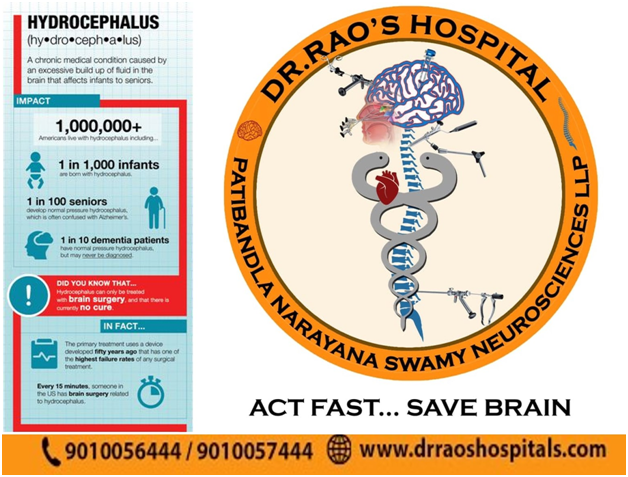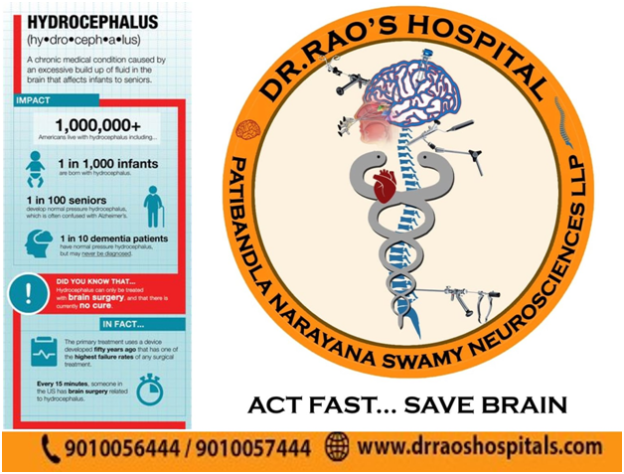Hydrocephalus: All you need to know
Various illnesses and diseases have an impact on the brain. This article discusses a type of brain condition known as ‘Hydrocephalus.’
What is Hydrocephalus, and how does it affect you?
We may deduce from the name that it relates to water/fluid because it contains the word hydro.
Yes, Hydrocephalus is a condition in which the brain has excess water. It is a disorder in which the brain accumulates too much cerebrospinal fluid, causing increased pressure in the skull. The tissues that line the brain’s ventricles produce cerebrospinal fluid. The fluid travels around the brain and spinal column, filling gaps. It’s absorbed chiefly via blood vessels in tissues around the brain’s base.
Cerebrospinal fluid is necessary because it eliminates waste products from the brain’s metabolism and allows the brain to float within the skull. However, too much of this fluid is damaging to the brain, resulting in disorders like Hydrocephalus. But don’t worry, Hydrocephalus can be treated with therapy from the best neurology hospital in Guntur.
Who is at risk for Hydrocephalus?
Hydrocephalus is more common in infants and those over the age of 60.
What are the signs and symptoms of Hydrocephalus?

The signs and symptoms of Hydrocephalus differ depending on the age at which it develops.
The following are some of the most prevalent symptoms of Hydrocephalus in infants:
- Head size changes, such as a sudden increase in the size of the head
- Nausea and vomiting
- Feeling sleepy
- Downward-looking eyes
- Lack of sensitivity to touch
- Inadequate development
The following are some of the most prevalent symptoms of Hydrocephalus in older children:
- You have a headache.
- Visual impairment
- Feeling sleepy
- Nausea and vomiting
- An abnormal increase in the head’s size
- Appetite loss.
- Changes in personality
- Issues with speaking, walking, and other activities
- A poor academic record
The following are some of the most prevalent Hydrocephalus symptoms in young and middle-aged adults:
- You have a headache.
- Tiredness and sluggishness
- Visual impairment
- Issues with balance
- Issues with memory
The following are some of the most prevalent symptoms of Hydrocephalus in elderly adults:
- Urge to urinate regularly
- Issues with memory
- Issues with balance
- Walking difficulties
Please see a neurologist in Guntur if you have any of the above-mentioned symptoms. Numerous therapies and facilities are available in Guntur to treat such illnesses.
We now have a better understanding of the symptoms that people with hydrocephalus encounter. Let’s now look at some of the most common causes of hydrocephalus.
What causes Hydrocephalus, and how may it be treated?

An increase in CSF fluid in the ventricles causes Hydrocephalus. The following factors can induce an excess of cerebrospinal fluid in the ventricles:
A blockage in the flow of cerebrospinal fluid from one ventricle to other areas of the brain causes hydrocephalus.
Problems with Absorption: One of the most common causes of Hydrocephalus is poor cerebrospinal fluid absorption.
Hydrocephalus is caused by excessive cerebrospinal fluid production, which is greater than the absorption rate.
Some factors enhance the risk of developing Hydrocephalus. The following are a few of them:
- Tumors of the brain
- A head injury causes bleeding in the brain.
- Other types of traumatic brain damage
The following are some of the reasons that may cause Hydrocephalus in newborns:
- The abnormal development of the central nervous system causes a blockage in cerebrospinal fluid flow.
- Bleeding in the ventricles
Hydrocephalus Treatment
Hydrocephalus can be treated effectively with the help of experts in Guntur. In the case of severe Hydrocephalus, however, there may be severe consequences. The severity of the initial symptoms, how long it takes to diagnose and treat the condition, and other factors all affect the severity of complications.
Final Thoughts
This article helped us understand hydrocephalus and who is at risk of developing it. It also taught us about the signs and symptoms of hydrocephalus, which vary depending on whether the patient is an infant, a kid, or an adult. We also discovered that cerebrospinal fluid production and absorption imbalances cause hydrocephalus. We also learned about the most prevalent cause of hydrocephalus and the difficulties that come with it.
On the other hand, Hydrocephalus can be effectively treated with no severe problems if treated promptly and adequately by a neurologist in Guntur. So, if you’re experiencing any of the hydrocephalus symptoms listed above, see a neurologist in Guntur immediately. “The sooner, the better,” as the saying goes. The sooner an issue is identified and treated, the better, as it decreases the severity of treatment-related consequences. As reported by ahmedabadmirror
In Conclusion
Choosing the right neurosurgeon for brain tumor treatment is crucial for ensuring the best possible outcomes. Dr. Rao at Dr. Rao’s Hospitals in Guntur and the other top specialists listed represent the pinnacle of expertise and compassionate care in neurosurgery. If you or a loved one are seeking treatment for a brain tumor, consider reaching out to these esteemed professionals. According to The Times of India coverage.
Contact Information:
- Phone: 9010056444, 9010057444
- Email: info@drraoshospitals.com
- Address: Old Bank St, GV Thota, beside AK Biryani Point, Guntur, Andhra Pradesh 522001
- Website: Dr. Rao’s Hospital


